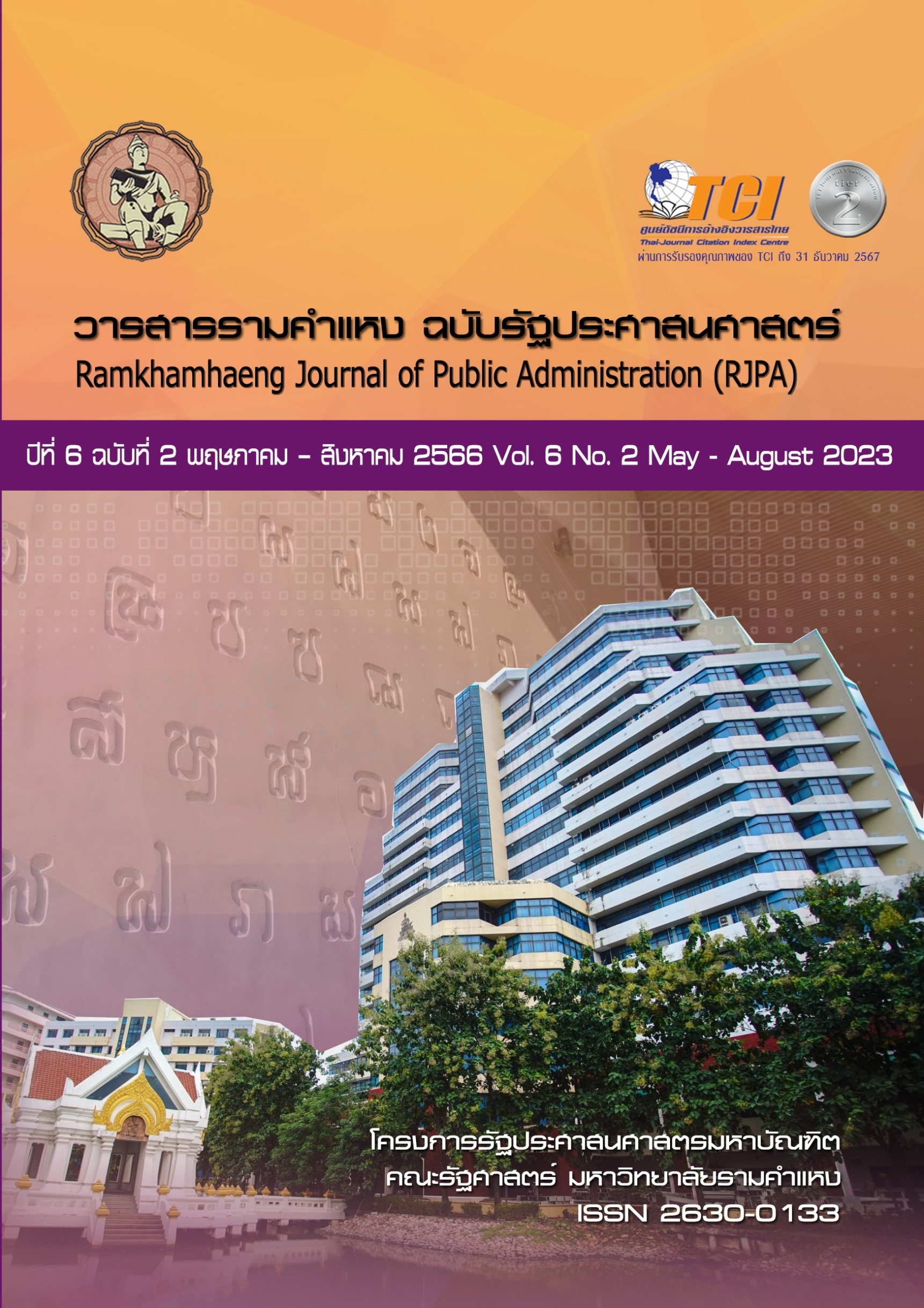Political landscape of students from B.E. 2557 to 2564 on political formation, Democratic ideology and political discourse
Keywords:
Political landscape, political formation, democratic ideology, political discourseAbstract
This research is a qualitative one, collecting data form related documents. It aimed to study 1). political landscape of students, 2). factors formulated those student to express their political opinions and 3). their democratic ideology and political discourse. It is found that such political situation is characterized by the use of power to control public space when student groups show political expression and when student groups have political activities, for example, public gathering, showing of political opinion through social media channel. This showing of different political opinion of students is controlled by prosecution against student groups. The factors that cause the formation of students to express political opinion, are political conflict factors, technology advancement factors, factors of idea influence of scholars and education institutes and factors on democratic knowledge foundation. Moreover, it is found that students who express political opinion want to see democratic politics, consisting of principles of right, liberty, equality, equal right and fraternity. Concerning political discourse of those students, their political expressions produce political discourse to incite idea, collective action and create practical motivation, for example, “Let it ends in our generation”.
References
กนกรัตน์ เลิศชูสกุล. (2561). การเติบโต ความถดถอย และการฟื้นตัว ขบวนการนักศึกษาไทย. วารสารพัฒนศาสตร์, 1(1), 130-177.
ชาญวิทย์ เกษตรศิริ. (2544). ประวัติการเมืองไทย 2475 – 2500. กรุงเทพฯ: โครงการตำราสังคมศาสตร์และมนุษยศาสตร์.
ชยุตม์ พันธุ์สุวรรณ. (2561). ขบวนการนักศึกษาหายไปไหน: การเปลี่ยนแปลงของขบวนการนักศึกษาไทยในช่วงความขัดแย้งทางการเมือง พ.ศ. 2549-2557. วิทยานิพนธ์ศิลปศาสตรมหาบัณฑิต, สถาบันบัณฑิตพัฒนบริหารศาสตร์.
ไทยรัฐออนไลน์. (2562ก). นิรโทษกรรม "สุดซอย" หายนะ "เพื่อไทย" ลุงกานัน ปั่นม็อบลุกฮือ ขับไล่ยิ่งลักษณ์. ค้นเมื่อวันที่ 27 พฤศจิกายน 2565, จาก https://www.thairath.co.th/news/politic/1505783
นลินี ทองประเสริฐ. (2555). บทบาทของสังคมออนไลน์ต่อสำนึกทางการเมืองของนิสิตนักศึกษามหาวิทยาลัยในภาคตะวันออกเฉียงเหนือตอนล่าง. วารสาร มฉก.วิชาการ, 16(31), 65-75.
บีบีซี นิวส์. (2563). 10 ปีสลายการชุมนุมคนเสื้อแดง : สารวจชีวิต “ตัวละครเอก” ของศอฉ. และ นปช. ใน 5 ฉากสำคัญการเมืองไทย. ค้นเมื่อวันที่ 27 มีนาคม 2566, จาก https://www.bbc.com/thai/thailand-52676263
ประชาชาติธุรกิจออนไลน์. (2563). ทบทวนประวัติศาสตร์ อ่านข้อเรียกร้อง “ม็อบนักศึกษา” จากอดีตถึงปัจจุบัน. ค้นเมื่อวันที่ 8 กันยายน 2564,จาก https://www.prachachat.net/d-life/news-528775
ผู้จัดการออนไลน์. (2563). แนวรบด้าน Social Media รัฐเป็นรองคนรุ่นใหม่. ค้นเมื่อวันที่ 10 กันยายน 2564, จาก https://shorturl.asia/BDuGt
พระครูเกษมวัชรดิตถ์ และคณะ. (2565). การสื่อสารทางการเมืองกับวาทกรรมทางการเมืองในสังคมไทย. วารสารรัฐศาสตร์ มหาวิทยาลัยมหามกุฎราชวิทยาลัย 2(5), 99–101.
ภาคิไนย์ ชมสินทรัพย์มั่น. (2554). ขบวนการนักศึกษาไทย : วิเคราะห์ความเคลื่อนไหวของขบวนการนักศึกษาไทยในเมืองช่วงระหว่าง 6 ตุลาคม ตุลาคม 2519 ถึงปี พ.ศ.2531. วิทยานิพนธ์รัฐศาสตรมหาบัณฑิต, จุฬาลงกรณ์มหาวิทยาลัย.
รณันธร พลชาติ. (2558). การใช้สื่อทางสังคม: เฟซบุ๊คในการดำเนินการทางการเมืองไทย. ดุษฎีนิพนธ์ปรัชญาดุษฎีบัณฑิต, มหาวิทยาลัยรามคำแหง.
ศุภัทรา อานวยสวัสดิ์. (2563). พฤติกรรมทางการเมือง. กรุงเทพฯ: สานักพิมพ์มหาวิทยาลัยรามคำแหง
ศิลปวัฒนธรรม. (2565). ประวัติศาสตร์เกิดอะไรใน “14 ตุลา” ก่อนมาสู่ชัยชนะสาคัญของประชาชนลุกฮือต้าน “คณาธิปไตย”. ค้นเมื่อวันที่ 16 พฤศจิกายน 2565, จาก https://www.silpa-mag.com/history/article_40175
ศิลปวัฒนธรรม. (2560). วันนี้ในอดีต 14 ตุลาคม 2516 รัฐบาลทหารใช้กำลังสลายผู้ชุมนุมเรียกร้องประชาธิปไตย แต่สุดท้ายสิ้นอำนาจ. ค้นเมื่อวันที่ 16 พฤศจิกายน 2565, จาก https://shorturl.asia/RF7ZY
สมชัย แสนภูมี. (2562 ). นักศึกษากับการเคลื่อนไหวทางการเมืองในวันครบรอบ 1 ปี การทำรัฐประหารของพลเอกประยุทธ์ จันทร์โอชา. มนุษยศาสตร์, สังคมศาสตร์, และศิลปะศาสตร์, 12(1), 1089-1106.
แอมเนสตี้อินเตอร์แนชั่นแนลไทยแลนด์. (2564). สิทธิมนุษยชนถูกละเมิดอย่างไรใน 6 ตุลา. ค้นเมื่อวันที่ 16 พฤศจิกายน 2565, จาก https://www.amnesty.or.th/latest/blog/919/
Foucault, M. (1982). The archaeology of knowledge: and the discourse on language. New York: Vintage.
Downloads
Published
How to Cite
Issue
Section
Categories
License
Copyright (c) 2025 วิทวัส ไกรสวัสดิ์

This work is licensed under a Creative Commons Attribution-NonCommercial-NoDerivatives 4.0 International License.



